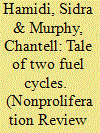| Srl | Item |
| 1 |
ID:
184972


|
|
|
|
|
| Summary/Abstract |
In 2005, the United States recognized India as a ‘responsible state with advanced nuclear technology’. How did India go from pariah to a legitimate nuclear state? This article historicizes the concept of nuclear responsibility to explain India's shifting place in the nuclear regime. Existing perspectives view responsibility as a function of discrete state behaviors to the detriment of understanding the relationship between power and responsibility as a discourse. This article tracks the evolving discourse of early proliferators, such as the US, UK and France, who legitimated their possession of nuclear weapons by linking responsibility with deterrence. In its early nuclear history, India challenged these hegemonic perspectives but more recently adopted the deterrence model of responsibility to be granted recognition and legitimacy in the global nuclear regime. The article concludes that nuclear states’ success in linking deterrence with responsibility complicates the place of disarmament as an alternative nuclear responsibility discourse. Tying deterrence to responsibility reshaped the global order around the continual presence of nuclear weapons, narrowing moral agency and limiting a nuclear weapon-free future. Reclaiming responsibility will require moving beyond the typical state-centric politics of blame towards institutional and structural approaches to moral agency.
|
|
|
|
|
|
|
|
|
|
|
|
|
|
|
|
| 2 |
ID:
191980


|
|
|
|
|
| Summary/Abstract |
In the early 2000s, the George W. Bush administration condemned Iran’s use of nuclear-fuel-cycle technologies while endorsing sensitive nuclear activities in South Korea. The politics behind this difference may appear self-evident, but maintaining this policy was premised on a complex interaction between technology and politics. This paper examines both US and international definitions of uranium enrichment and spent-fuel reprocessing and finds an incoherence between technical definitions and policy implementation. Definitions of enrichment are narrow, as they refer to a very specific set of material processes. But the Bush administration applied a capacious standard when debating what it meant for Iran to “suspend” enrichment-related activities. On the other hand, definitions of reprocessing are capacious, implicating many different processes that can be interpreted as reprocessing. And yet the Bush administration applied a narrow standard as it sought to assist South Korea’s pyroprocessing efforts. By positing a reciprocal relationship between technology and politics, this article challenges both the position that technical solutions can solve entrenched political conflicts, and also the simplified narrative that great-power politics trumps shared technical and legal standards. Interpretive conflicts over technical standards are shaped by politics, and yet technical contestation also limits and bounds political manipulation.
|
|
|
|
|
|
|
|
|
|
|
|
|
|
|
|